Find “amore” when you visit Emilia-Romagna
It’s not a secret that I fell in love with the Emilia-Romagna and Puglia regions of Italy last year. You might recall that I revealed my love for Puglia (the region of Italy located in the “heel of the boot”) and the reasons why in a previous post. As in Puglia, in Emilia-Romagna we met many wonderful people who were friendly, helpful, and very understanding of our extremely limited Italian language skills. Certainly, interacting with locals really adds to our enjoyment of any place. In my previous posts, you met some of them. Now I want to highlight some of the things you can do when you visit Emilia-Romagna to make it special for you, too.
1. Stay in an albergo diffuso
To stay in an albergo diffuso (loosely translated as “scattered lodgings”) is to experience an immersion into the local culture and traditions of the region. Mr. TWS and I felt like part of the family at Al Vecchio Convento in Portico di Romagna and were also just as at home at Le Case Antiche in Verucchio.
Al Vecchio Convento – Portico di Romagna
Le Case Antiche – Verucchio
There are alberghi diffusi (plural form) in many regions of Italy and the number continues to grow. The concept was introduced by Giancarlo Dall’Ara (president of Associazione Internazionale Alberghi Diffusi) in the 1980s to help economically suffering Italian villages where in many cases the younger generations were moving out, leading to the villages becoming stagnant or abandoned. His idea was to renovate existing buildings in these towns to become distributed lodging for visitors offering comfortable accommodations and hotel-like services, while enabling the visitors to essentially live among the locals, often in centuries-old buildings. Visitors also enjoy regionally-sourced food and wine, discover local culture and history, and learn traditional crafts.
2. Try your hand at something new
Make pasta fresca
Our first glimpse of fresh pasta being made was in a restaurant in Modigliana where we stopped for lunch on our way to Tredozio. We were invited back to the kitchen where we watched in fascination as noodles were made from scratch. Since this was our very first day in Emilia-Romagna, it just whet our appetites for more to come during the rest of our trip.
My travel companions and I had an awesome private pasta-making lesson arranged for us at Pasta Fresca Laura in Santarcangelo, but classes can be found in throughout the region.
Bake bread
Working as a team, my companions and I diligently followed every instruction from Matteo at Al Vecchio Convento as we rolled our bundles of dough into loaves of country bread before placing them in an outside wood-fired oven. As we went along, Matteo explained the process, including techniques for each step; information about the ingredients; the restaurant’s devotion to local sourcing and its benefits; and bread-making traditions.
Learn a craft
Al Vecchio Convento also arranged for a weaving lesson by Giuliana in Portico. Guiliana is a skilled weaver who works on a loom in the old traditions of weaving. I may not be a natural at this craft, but I persevered and left the shop with my very own handmade necklace and a heightened admiration of the skills and art involved in weaving.
My learning experiences were arranged by our guide for these specific locations. Each albergo diffuso will have a range of activities and recommendations that help to immerse you in their culture and traditions.
3. Experience history and culture
Visit a castle or two or three or more
In Verucchio, we had a wonderful tour of the Malatesta Fortress with numerous exhibitions of armor, weapons, and other historical artifacts. Perched on a rocky hilltop above the Marecchio Valley with the Adriatic Sea to the east and the Apennines to the west, it had a strategic location for defense and trade, making it a critically important fortress for the Malatesta family who ruled the area for centuries. Mastin Vecchio, head of the original ruling family, was born in Verucchio (although there is some debate) and the family’s reign of power began here, which is why Verucchio is known as the “cradle of the Malatesta”. From our Le Case Antiche patio, we had a stunning view of the castle above us (shown below).
Inside La Rocca Malatestiana in Cesena, another of the medieval fortresses built by the ruling Malatesta family in Emilia-Romagna, our guide took us down the old stone corridors with loopholes (openings for light, air or shooting) and into several chambers including the museums with well-preserved artifacts, such as the armor shown in the photo below.
In Ferrara, the Castello Estense is a place of amazing history that holds stories of Medieval and Renaissance passion, treason, power, and torture. Built in 1385 as a fortress to protect the ruling Este family from uprisings of the people, Castello Estense later became the royal residence. Its architectural details span Medieval and Renaisance periods as enhancements were made through the centuries. The water-filled moat still surrounds the castle. In the photo below, we’re looking across the moat into the old town center of Ferrara through a loophole in the castle wall . The interior of Castello Estense has many ornate halls and rooms in the noble living quarters on the first floor.
From the fortress in San Leo there are fantastic views of the beautiful countryside and towns below contrast with the evils that took place inside the fortress. It’s fascinating as well as disturbing to walk inside the torture chamber which still includes actual torture devices dating back to the Inquisition. The fortress at San Leo has played an important role in historical and military events of the region, and continued to be used as a prison until 1906.
Art, both ancient and new, abounds in the region in galleries, museums, churches, castles, and festivals. We were fortunate to attend the first annual Portico in Arte Festival created by Massimiliano Cameli in Portico di Romagna. During the festival, artists from all over Europe exhibit their works inspired by the area’s beauty, history and culture.
Near San Leo high above the Valmarecchia, enjoy the vista that many believe (and there is much to support this belief) inspired Leonardo da Vinci when he painted the Mona Lisa. Next time you see this famous painting, look closely at the background. These may be the hills you see in the photo below. There’s research that shows that the background is a combination of landscapes of the Marche and Emilia-Romagna regions of Italy.
The 15th century Biblioteca Malatestiana was the first public library in Italy and is listed in UNESCO’s Memory of the World Register. It is a truly beautiful place with history and exhibits that compel you to stop, think and imagine. The main reading room where the Franciscan monks studied is remarkable in its simple, yet stunning design with 11 arches over 58 desks and windows that provide hat allow for natural lighting. In the Piana Library across the hall from the main reading room there are many ancient books and letters as well as portraits of three popes (two who were born in Cesena and one who was bishop here). I was taken by the case where very small books were displayed, including the world’s smallest book that can be read without a microscope (shown below, bottom center).
4. Indulge in Epicurean delights
Discover wines of Emilia-Romagna
Until the first of my visits to Emilia-Romagna, I had never tasted Sangiovese — although I unknowingly would have tasted it in Chianti. But here one can enjoy 100% Sangiovese made from the luscious grapes grown in the region’s vineyards.
Alta Vita where I got to experience picking grapes right off the vines.
Tenuta Masselina where we walked through the vineyards in an early autumn mist.
Collina dei Poeti where we were served dishes made with pasta we made from scratch at Pasta Fresca Laura.
Hunt for truffles or just eat them
We really loved this activity provided by Al Vecchio Convento. Matteo and his dogs Otto and Rex can take you on a truffle-hunting excursion in the nearby woods that are officially registered for this purpose. Of course, the dogs do the work of finding these hidden treasures, but walking and running along with them as they sniff out the white or black (depending on the season) is a lot of fun and you’ll feel like you participated in the find. To make the experience even better, you’ll get a chance to taste the truffles as the restaurant uses them in many dishes. We had them shaved on our eggs the next morning at breakfast.
If you visit in October when the white truffles are in season, be sure to check out the festival in Sant’Agata Feltria. You’ll find porcini and truffles in many dishes prepared in many different ways.
Taste the nuances of olive oil
The olive groves of Brisighella are famous for the delectable oils they produce. They are beautiful to view on the hillsides as you pass them or walk among the trees themselves. We were guests of Gianluca of Tenuta Pennita who took us on a tour of his groves followed by a tasting of different olive oils. There is a specific technique to properly tasting and comparing the oils and would take much more practice for me to become proficient.
To a novice like myself, tasting several oils straight from the cup (no bread or other food to accompany it) can be a little overpowering the first time, but it’s a learning experience not to miss.
Savor the cuisine
Be prepared to over-indulge on scrumptious dishes served in ristorantes and trattorias. Memories of these dining experiences particularly make my mouth water.
In a small village like Portico di Romagna, you might be surprised to learn of the gourmet restaurant at Al Vecchio Convento prepared by master chef Giovanni Cameli and his sons, Massimiliano and Matteo (yes, the same Matteo who truffle hunts, bakes bread, leads hikes, and much more). They abide by the “slow food” principles of preserving traditional and regional cuisine prepared with locally-sourced meats, dairy, fruits and vegetables.
For sublime Italian comfort food, I really enjoyed Trattoria Montepaolo in Dovadola. Chef Franco Gamberini had been attracted by the beauty of this location on Monte Paolo where since 2001 he is serve creative culinary specialties of the Romagna and Tuscany regions, including homemade pasta and bread.
A short drive into the hills from Sant’Agata Feltria at Trattoria Ciccioni in Pereto, we were served course after course of homemade dishes. Many were prepared with local porcini mushrooms as a main ingredient, but each recipe was a creative variation. The Pasta stuffed with cheese and porcini, and lentil and porcini soup were probably my favorites.
Finally, in Verucchio, we had a hearty meal featuring T-Bone steak and grilled vegetables with a view at La Rocca in Verucchio (at the fortress). Here a big treat was their signature special liqueur, Infuso di Marghertia, named for the owners’ grandmother. It is similar to Limoncello and absolutely delicious.
5. Hike, Bike, Walk, and Spa
All of those activities are good for the body and you’ll have ample opportunities for each.
Take a hike at National Forest a hike at Foreste Casentinesi, Monte Falterona, Campigna National Park (Casentinesi Forest National Park). With Matteo of Al Vecchio Convento as our guide, we took the Acquacheta Falls trail, which includes the famous falls mentioned by Dante. There are several hiking and nature trails to suit most ability levels.
Bike through the streets and around the ancient walls of the city of Ferrara where bike culture is evident as residents and tourists alike pedal through the streets, squares and even around the 9k distance of the old city walls. There are a number of bike rental locations in the city center.
Walk through the winding, narrow streets of the villages like Bertinoro shown in the photos below. Don’t worry about a map in small villages — just wander, admire, imagine, and get lost. You’ll find your way and come out with a feeling of having stepped back in time.
It’s not often that I get a chance to soak and relax at a spa, so when I do, I relish the experience as I did in the thermal waters at Grand Hotel Fratta Terme in Bertinoro. No, that’s not Mr. TWS and me, but I was in that very spot. Photos were not allowed to be taken in the spa.
Bonus reason: Be surprised
As you walk through the villages, drive along highways, tour historic places and sample the region’s food and wine, you will find surprises. Here’s just one of those.
Stand next to a volcano at Monte Busca
Do you know where the smallest volcano in the world is located? Well, “volcano” may seem like an exaggeration for such a small pile of rocks and flames, but the Monte Busca Volcano, in the hills near Portico di Romagna, Italy is constantly emitting flames due to a natural gas vent there. An interesting bit of history is that during WWII, troops used the flames for heat and cooking.
Perhaps you’ll find “amore”, too.

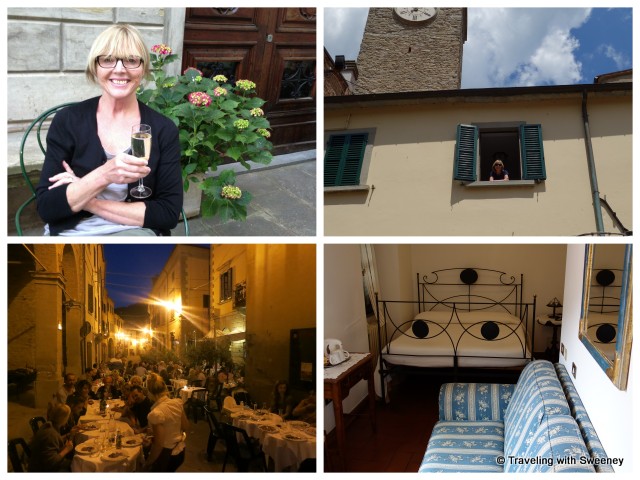
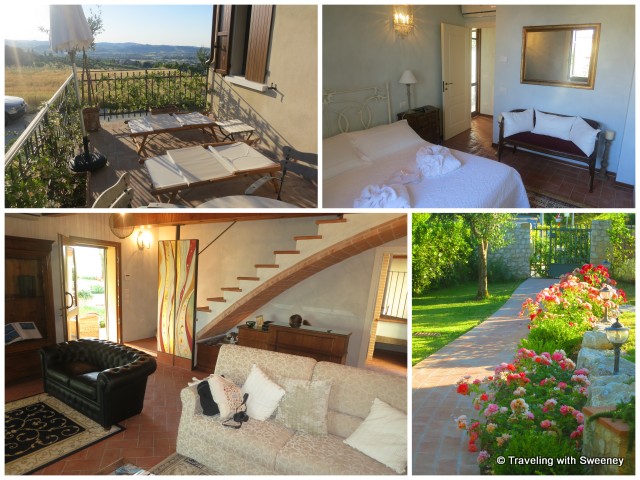
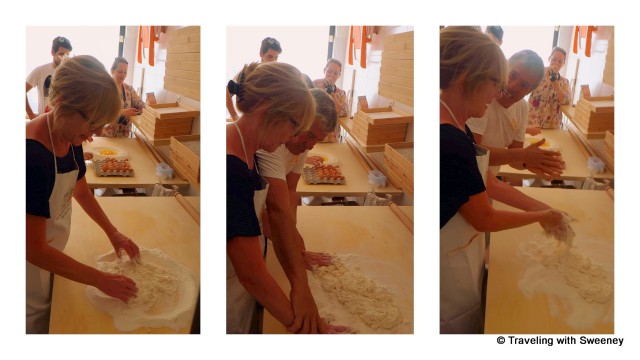
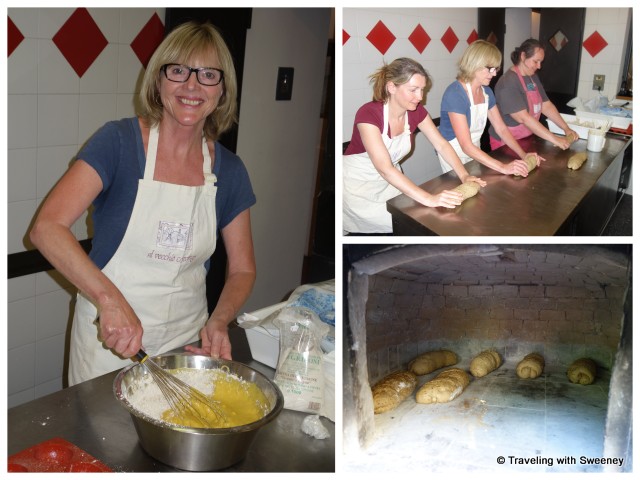
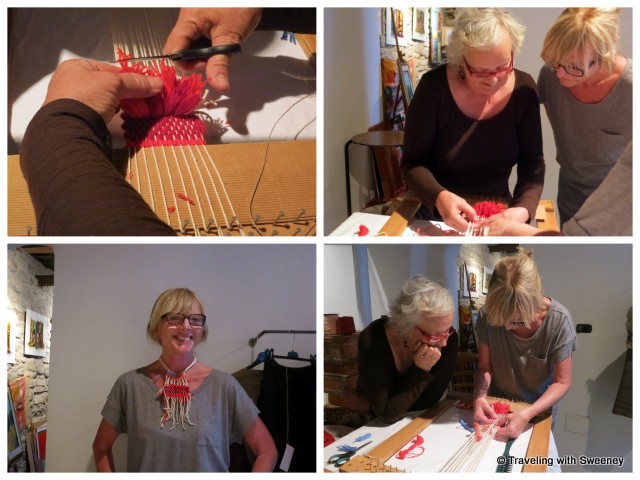
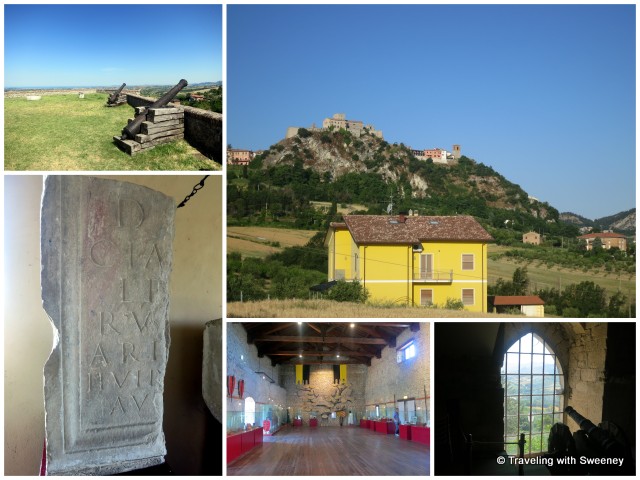
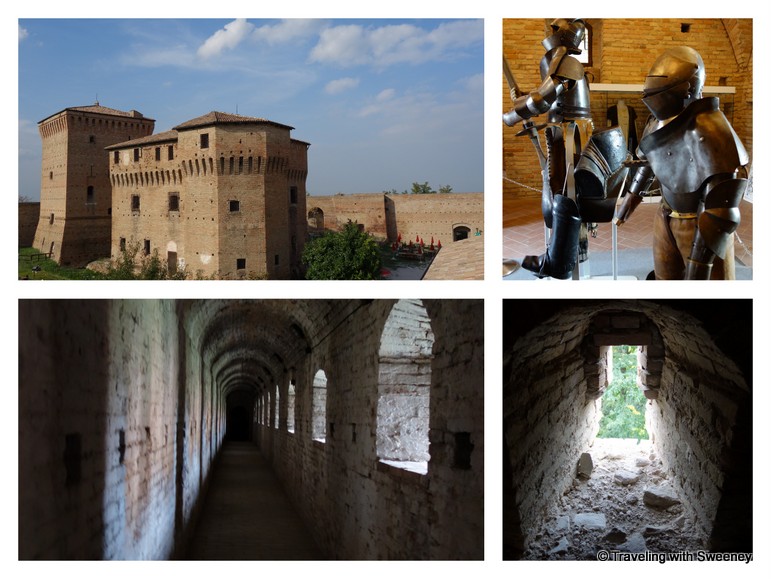
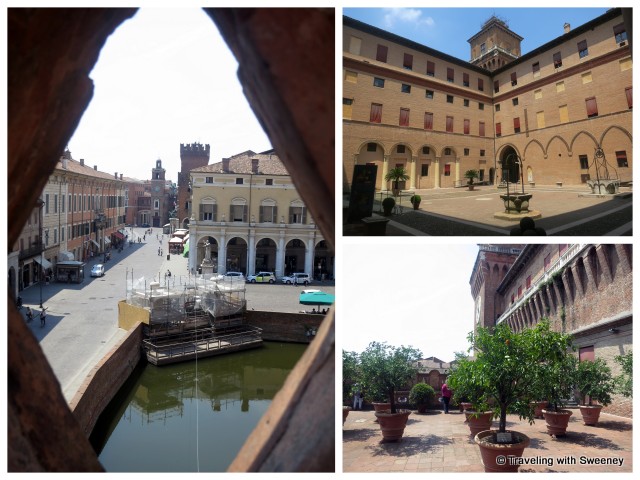
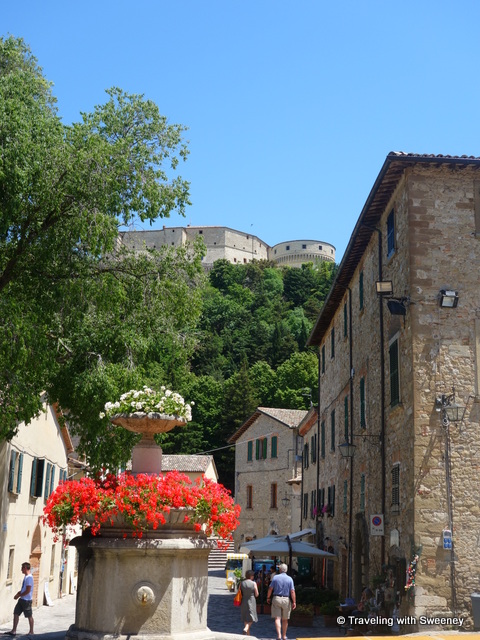
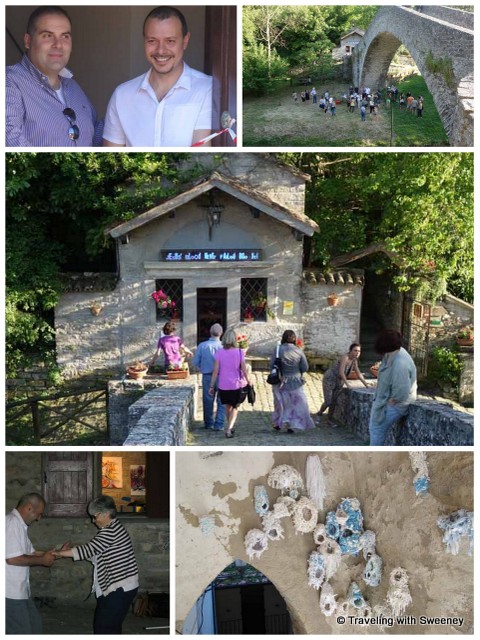

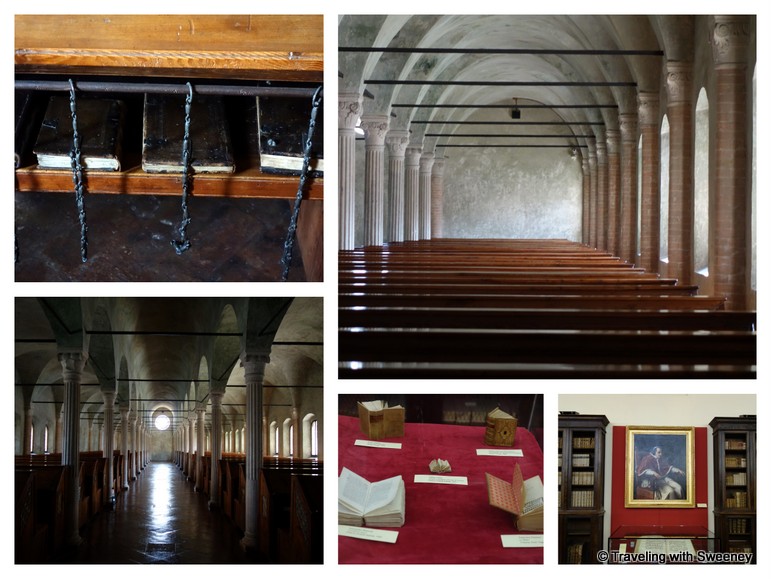
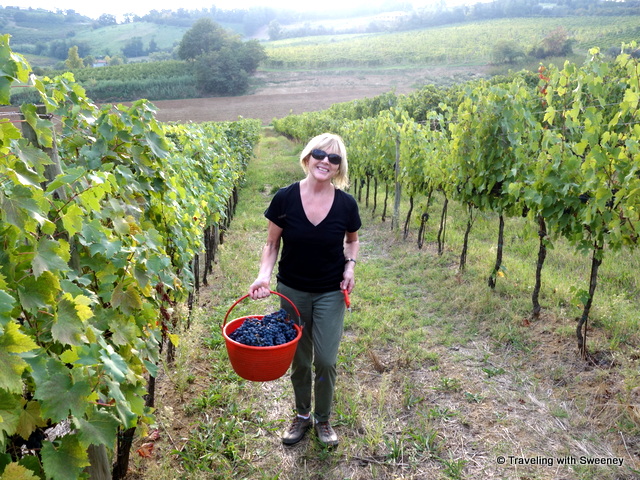
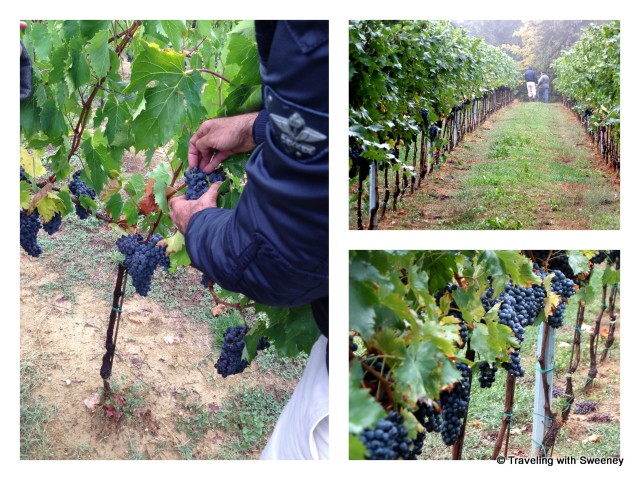
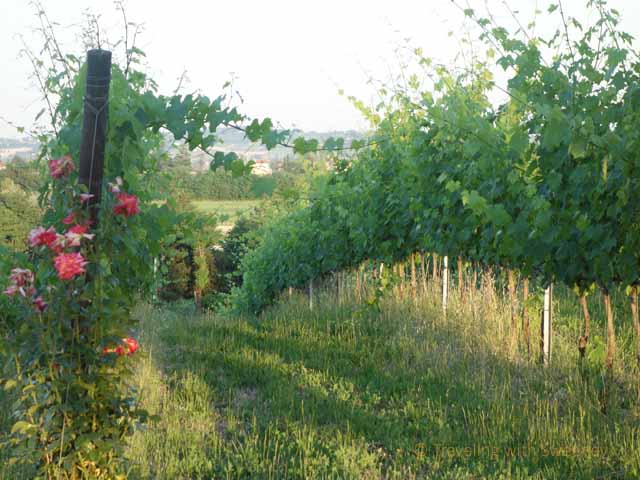

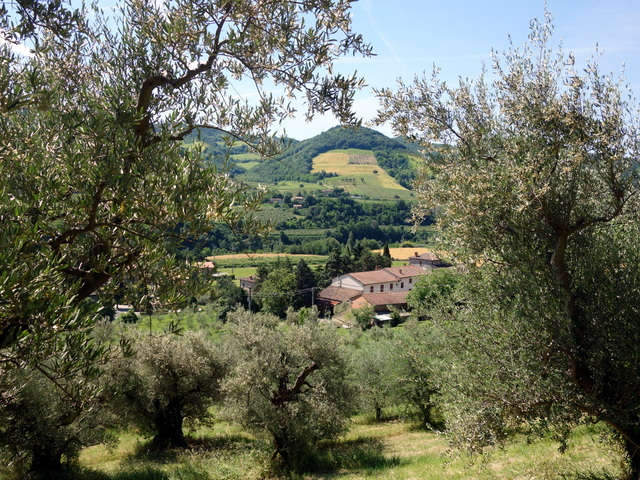
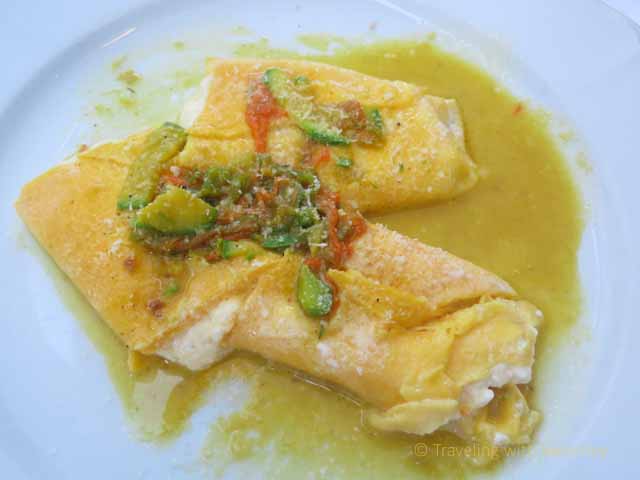
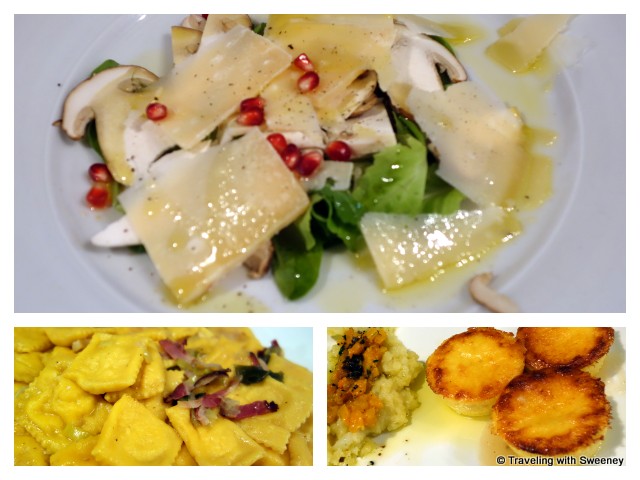
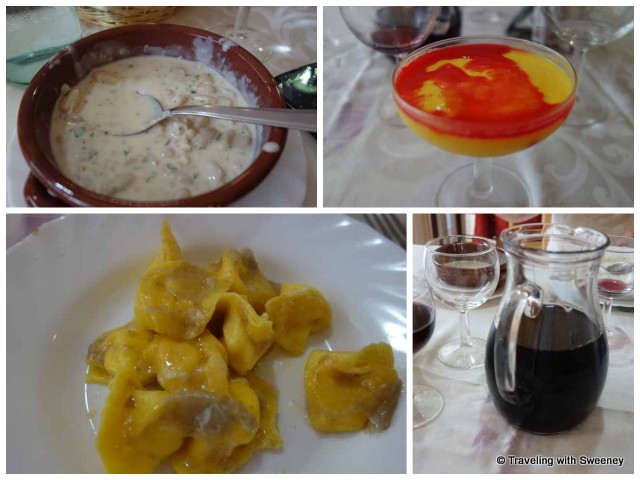
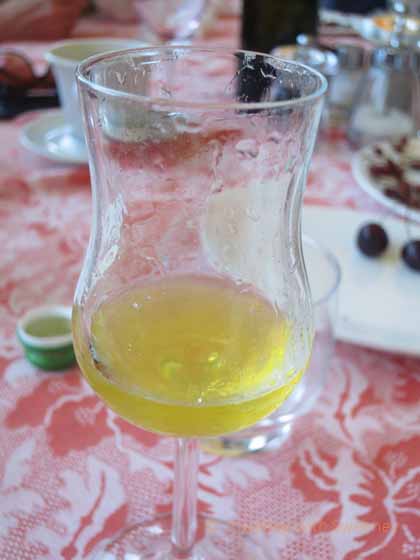
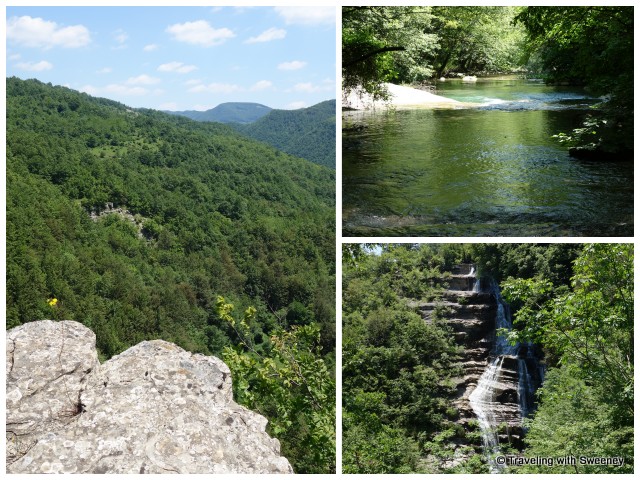
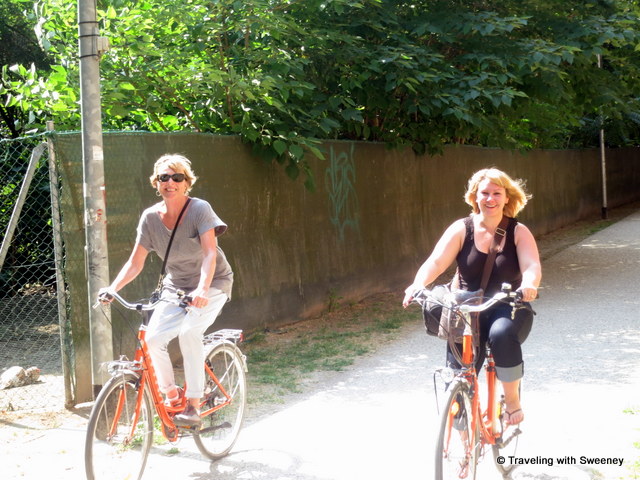
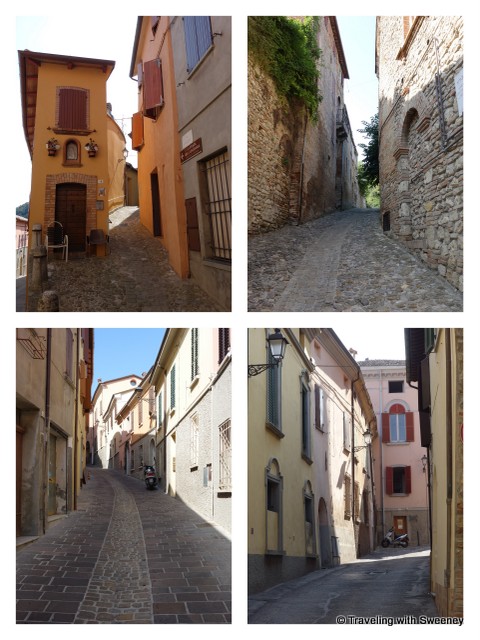
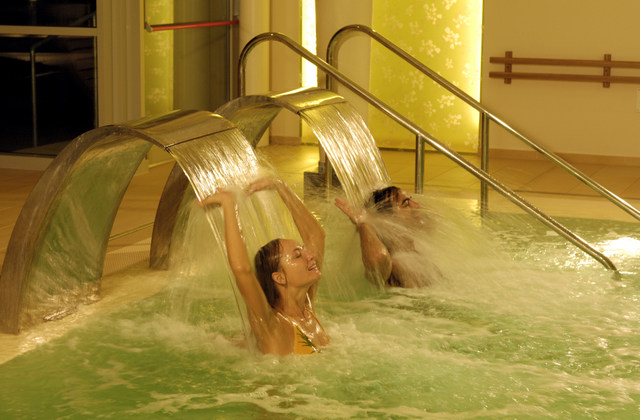
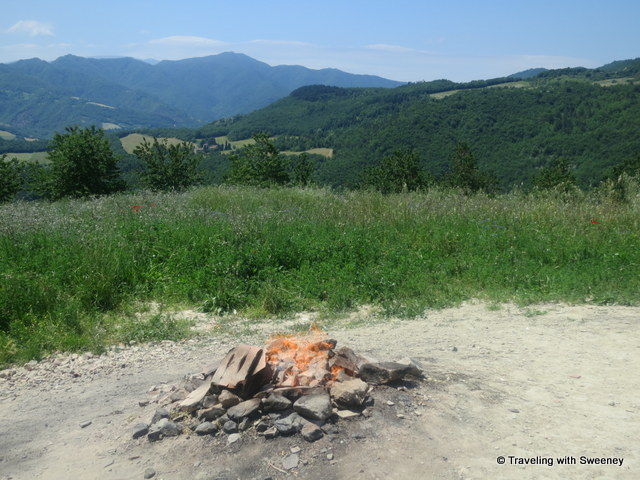
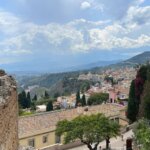
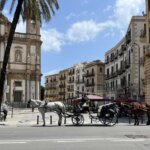
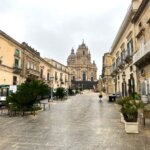
What an immersion into Italian culture this trip must have been!! I would give anything to experience all that you have just written about…and the culinary indulgences are certainly a worthy payoff for all that harvesting you did.
My two trips to Emilia-Romagna were both fantastic experiences — ones that really left a mark on me. Oh, yes — that was such difficult “harvesting work”. 🙂
Hey Catherine, You’ve seen a lot of Italy that I have not yet, and some I have. Those food photos at Montepaolo made my mouth water. I also loved the library in Cesena. Perhaps you should have mentioned Chef Carlo? :))
Thanks for mentioning Chef Carlo, Penny. Actually, I mentioned him (and included a photo) in an earlier article about our time in Cesena. Here’s the link if you get a chance to take a look –> https://travelingwithsweeney.com/2013/11/15/buonvivere-good-living-cesena/
Emilia-Romagna brings back great memories for me! Wonderful collection of photos!
Thanks, Cacinda. You love Italy, too!
This looks like such a lovely area of Italy with so much to do, Cathy! My only experience in Italy is a few days spent in Rome and one day on a cruise stop visiting Pompeii and Sorrento and I would love to see so much more of this beautiful country. Your post makes me want to start with Emilia-Romagna!
Yes, do start with Emilia-Romagna. Wonderful introduction to the Italy beyond the large, famous cities. You will love the people, food, wine… everything.
This is outstanding! You’ve totally convinced me to visit Emilia Romagna! I do need to get down that way eventually, as it’s close to Calabria, the part of Italy from which my dad’s family originates. Your photos are incredible. I’m now in love with Biblioteca Malatestiana;I want to open a bottle of Sangiovese; and Bertinoro is calling my name!
DISREGARD! LOL I had Puglia on the brain when I said it’s close to Calabria. Emilia Romagna is nowhere near there! Ha ha – where’s that bottle of wine?? 🙂
No problem. Puglia is often on my mind, too. 🙂 Loved both of these regions of Italy. About Sangiovese, I loved it! And this coming from a woman who lives in Northern California. 🙂
What’s not to love about this area – especially when you end with a hike and a trip to the spa? Between truffles and pasta making, wine tasting and feeling like you’re part of the family, it almost looks too good to be true.
You know, I kept thinking about lucky I was as I was having some of these experiences. Both trips to Emilia-Romagna were special times and I reflect on them often. I suppose it could seem too good to be true, but it most certainly was! 🙂
Amazing place! I really like the different kinds of activities and all those cooking, I bet you are now an expert in making Italian cuisine? I love Italy and would love to explore more of Emilia-Romagna – you’ve certainly convinced me!
Well, I can’t say that I’m an expert in making Italian cuisine, but I’m quite good at eating it — a lot of it!
I have enjoyed all your Emilia Romagna posts so this was a treat to be reminded how beautiful this area is. I love all the activities especially the pasta making and grape picking. What an experience, Cathy. We’re going back to Italy in Nov. but now I’m wishing we had more time to go here too. Beautiful photos!
I know I shouldn’t, but I get a little envious whenever someone tells me they’ve got plans coming up for Italy. I hope my next time won’t be too far off. Have a fabulous trip!
Looks like you had an amazing time with so many different hands-on experiences. I’ve been to this area a couple of times and it has so many wonderful things to offer. Love the countryside around Rimini, the food and the history.
So you know first-hand what I’m talking about. There are still many parts of the region for me to explore. I would go back for a 3rd trip in a heartbeat.
We love the gastronomic options available on a visit to this region. Those crepes look delish. Fancy washing them down with some of that local wine.
I couldn’t agree with you more. Ricotta crepes + Sangiovese = perfect.
I can’t get enough of Italy but this is a part of the country I really don’t know a lot about. Will have to change that though as it looks beautiful – and who could resist that wine and the spas!
I think that places like this are totally addictive. I can’t get enough either. My second trip to Emilia-Romagna was only a few months after the first and I can’t wait to go back again.
I so agree with you, Cathy. I can see why you’ve liked this area so much. Staying local, being totally immersed in the everyday life of a community is the absolute best way to experience a new place. Hotels are fine and sterile.
I love traveling this way myself and when I go to Italy, I’ll certainly be looking to stay at an albergo diffusi. I bet your Italian has also improved, right?
Thanks for introducing me to this region, Cathy!
I don’t know how much my Italian has improved, but —- Grazie mille, Marcia! The albergo diffuso concept is so intriguing and wonderful, unique experiences are being created because of it.
I do love Italy as well Cathy and your post makes me want to return. It would be great being there for grape harvest, wouldn’t it? Actually, it would be great being there any time of the year!
Any time of year is fine with me. Italy is a place where my enjoyment of what it has to offer probably wouldn’t be too affected by weather. Although, I can only vouch for early summer and early fall — fabulous times to visit.
Blimey, you packed a helluva lot into that trip! Gotta offset all that pasta somehow I guess! 🙂
Just to clarify, it was 2 separate trips close together. Even then, it was a lot to pack in and I loved it all.
You’ve sold it to me. Must start looking at planning a trip. Thanks for the great post.
Thank YOU for coming by. Do plan a trip there if you can and go back through some of my posts about the places I stayed. I highly recommend all three that I mentioned here.
Love it 🙂
Thanks! I love Italy.
All gorgeous. Why have I not been in Emilia-Romagna yet… incomprehensible. Will have to put it on the 2015-list.
Please do put it on your list. You won’t be disappointed if you take part in some of the things I did. Really!
Amazing list and photos! It looks like you had a very authentic experience! Thanks for sharing!
It was definitely an authentic experience. I’m grateful to our guide and hosts were really making us feel welcome and showing us what makes their region so special.
Just the other day I had a conversation with someone about Italy and how I haven’t been back in several years. Here’s another reminder… I’d love to visit this region and do a cooking class, that’d be my priority. Lovely photos of you!!
Thank you, Pola. I think my look in the pics conveys how I felt — happy!
I love cooking classes and the food would already be enough reason for me to go 🙂 But wow what a bonus; a beautiful area, lots of history and culture and so many things to do (although I am not sure about the weaving).
Weaving may not be for everyone, but it was fun to try. More importantly, it was interesting to meet Guiliana and see her at work on her loom.
Wow Cathy – comfy, cozy, great views AND fresh pasta classes… Sign me up!
This makes me missing Ferrara soooo badly! I
Pingback: albergodiffuso.com
Italy never ceases to amaze me. I’ve never heard of Emilia-Romagna before today, and now I’m totally jazzed about the place!
Pingback: Hidden Emilia-Romagna: Modigliana and Tredozio | Traveling with Sweeney